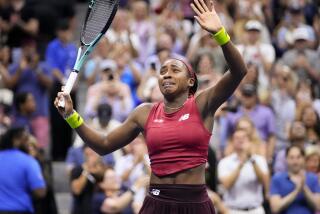Sampras Carries Chip on His ‘Old’ Shoulders
- Share via
NEW YORK — Pete Sampras doesn’t give away much, but he would have to be living in a bubble not to notice that his legacy and aura were taking serious hits after 17 tournaments without a title. His coach, Paul Annacone, said that, in rare unguarded moments, Sampras will make a throwaway comment, revealing his feelings.
“Every once in awhile, he’ll make a sarcastic remark, ‘Not bad for an old man,’ ” Annacone said.
Now, it’s the “old man,” plus two kids, defending champion Marat Safin of Russia and Lleyton Hewitt of Australia, and another late twenty-something guy, Yevgeny Kafelnikov of Russia, in the final four at the U.S. Open.
The 10th-seeded Sampras, the four-time champion, will meet No. 3 Safin in one semifinal, a rematch of their final here last year. In the other, No. 7 Kafelnikov will be trying to defeat No. 4 Hewitt for the second time in six meetings. To reach this stage, Sampras had to win two matches that were more like Grand Slam finals. He beat two-time champion Patrick Rafter of Australia in the fourth round and took out his legendary rival, two-time winner Andre Agassi, in a classic four-setter of tiebreakers in the quarterfinals.
Bring on Final No. 3, disguised as a semifinal.
Last year, Safin dismantled Sampras, 6-4, 6-3, 6-3, in the Open final, starting the buzz that Sampras was in a career decline.
“I just hope he comes down to earth,” Sampras said. “I was pretty humbled out there the last time I played him on that court.”
Safin, who had struggled through a miserable year until showing up in New York, has kept saying that he can’t possibly perform as well as he did last year. Even before Sampras beat Agassi, Safin was suitably impressed.
“The way they play the other day was ridiculous,” Safin said. “Pete was playing too good against Patrick Rafter, he [Rafter] couldn’t do nothing.”
Safin leads the series, 3-2; they are 2-2 on hard courts. The 21-year-old Russian has been through the gauntlet of tiebreakers, too, playing four in the second round.
*
History could be made with an all-Russian final. “I cannot even describe it to you,” said Kafelnikov, who reached the semifinals here in 1999. “It’s never happened before. It’s still a long way to go.” Kafelnikov, who beat No. 1 Gustavo Kuerten of Brazil in the quarterfinals, has been getting stronger in the later rounds. His first two matches went five sets, the next two four sets each, and he defeated Kuerten in straight sets.
*
Hewitt, a semifinalist last year, has not had an easy road, which included controversial five-setters against James Blake in the second round and Andy Roddick in the quarterfinals. Roddick, 19, lost his temper at 4-5 in the fifth set, throwing his racket and a verbal tantrum after his apparent forehand winner was overruled. He never recovered.
“I’ve had overrules,” Hewitt said. “... But you can’t say someone can’t overrule it because of what stage of the match it’s in. He can’t be biased and say, ‘It’s a tight, a close match, I can’t call this one. I have to go with the line call.’ ”
Long afterward, Roddick’s coach, Tarik Benhabiles, was still incensed.
“I think the umpire panicked,” he said. “He doesn’t have the courage and the mettle to umpire a great match. It cost you the semifinal, maybe cost you the U.S. Open. Who knows? Only God knows. I feel sorry for Andy. Andy has been great. He did great. He didn’t deserve that.”
More to Read
Go beyond the scoreboard
Get the latest on L.A.'s teams in the daily Sports Report newsletter.
You may occasionally receive promotional content from the Los Angeles Times.











